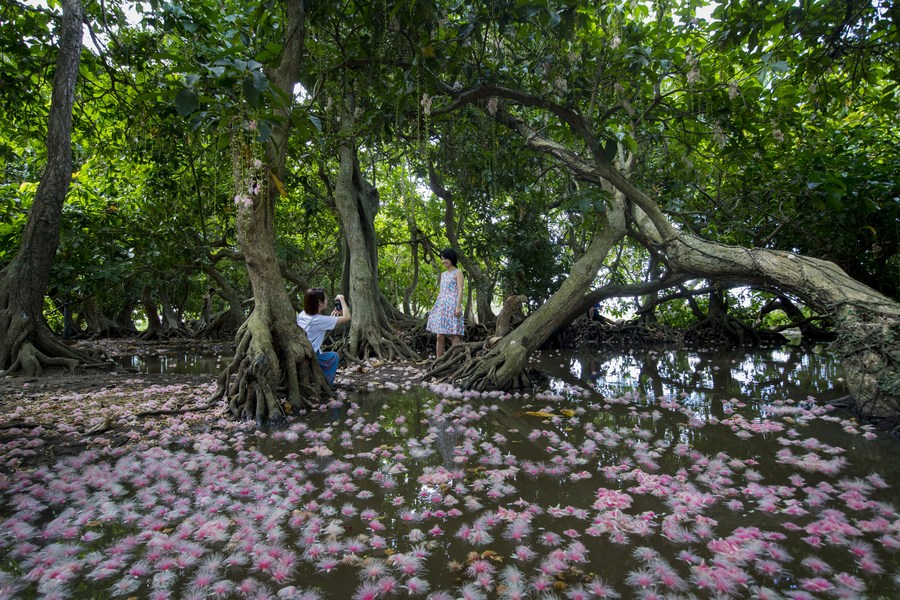
A tourist poses for photos in Yurui forest in Qili Village, Danzhou City, south China's Hainan Province, June 22, 2023. (Xinhua)
As the summer sun sets, the alluring fragrance of Yurui flowers becomes irresistible to tourists, drawing them to explore the village of Qili on the Chinese island province of Hainan.
The Yurui, a species of Barringtonia racemosa, is a tree that produces white, pink and red flowers. It usually blooms during the night from May to September, and has a delicate fragrance.
Famous during the Tang Dynasty (618-907), the Yurui is now rare in most parts of China due to climate change and the vicissitudes of dynasties. It mainly grows in southern Chinese regions.
Spanning an area of over 400 mu (about 27 hectares), the Yurui forest in Qili Village, Danzhou City, boasts more than 10,000 trees, most of which are older than 800 years and the tallest of which reaches 15 meters.
"It's my first time seeing the beautiful and unique Yurui flowers blooming at night. I never expected to find such a culturally rich and pleasant village in Hainan," said Wang Xiaozhen, a visitor from central China's Henan Province.
The village was founded over 1,300 years ago. According to genealogical records, the ancestors of the villagers migrated mainly from China's central plain area and settled in Qili, bringing the Yurui seeds with them.
The Yurui forest in Qili Village is an irreplaceable living specimen of freshwater wetland forest on Hainan Island, said Liao Baowen, a researcher at the Research Institute of Tropical Forestry under the Chinese Academy of Forestry. Liao has conducted several on-site studies on Qili Village's Yurui trees.
In February, China issued the "No. 1 central document" for 2023, the first policy statement released by the central authorities each year, calling for efforts to advance rural revitalization across the board and ceaselessly strive for the modernization of agriculture and rural areas.
The stunning Yurui blooms have now injected vitality into the development of tourism in Qili Village, giving impetus to its rural revitalization.
Curious tourists flock to Qili at nightfall, immersing themselves in its illuminated landscape and enchanting ambiance. The Yurui trees thrive along the riverbed and banks of a clear stream surrounding the village, while lanterns decorated with poetic verses and wooden plaques praising the trees enhance the atmosphere.
With the massive influx of tourists, village officials have seized the opportunity to develop Yurui products, aiming to expand the local tourism economy.
He Yaozhu, an official of Qili Village, said that various items made using fresh Yurui flowers, such as coasters, keychains and car ornaments, were much sought-after during the village's cultural festival. More products, like handmade soaps and scented candles, will be produced, the official added.
Days ago, the inaugural Yurui cultural festival in Qili Village attracted eight companies that have expressed their intention to invest, covering sectors such as agriculture, fishing and tourism. These companies would launch 34 projects with a total investment value of approximately 10.58 billion yuan (about 1.47 billion U.S. dollars).
Villager Jin Zhifang has witnessed the booming tourism industry in Qili. All of the more than 20 rooms in his four-story guesthouse were booked during his trial operations in May.
More young people are returning to the village to become entrepreneurs or seek employment.
"I've chosen veterinary medicine as my major and plan to come back to work in my hometown after graduation," said local He Fenglou, who just received an admission notice from a university in Anhui Province in eastern China.